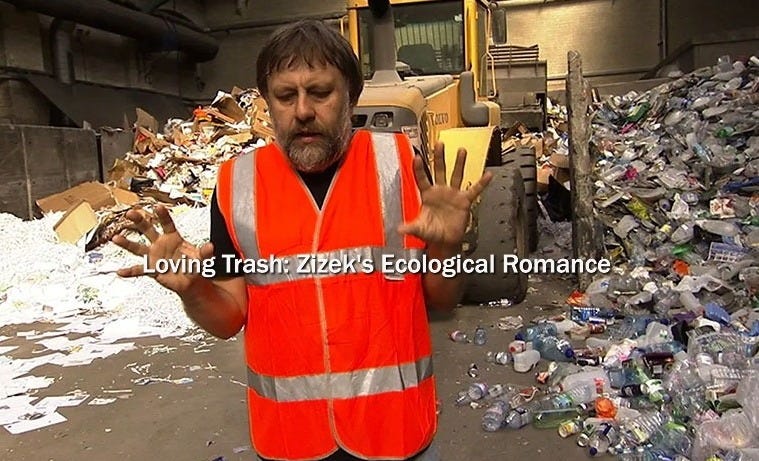Look, I know what you're thinking. Another philosophy piece about love that's going to make you question every relationship decision you've ever made while somehow connecting it to the climate crisis. But hear me out, because I recently stumbled back into that old documentary Examined Life: Philosophy is in the Streets and watched Žižek deliver one of those casual philosophical bombs that makes you realize you've been fundamentally misunderstanding both romance and recycling for years.
The Slovenian philosopher, in his characteristic style of making profound observations while gesticulating wildly, recently connected two dots that nobody asked him to connect but absolutely needed connecting: the nature of authentic love and genuine ecological consciousness. And honestly? It's the kind of insight that makes you want to text your ex an apology and then immediately start a compost bin.
The Idealization Trap
Here's where Žižek gets uncomfortably real about love. We've all been there, scrolling through dating apps like we're shopping for the perfect human specimen, crafting mental checklists of what our ideal partner should be. Six feet tall, financially stable, emotionally available, good at texting back, doesn't leave dishes in the sink, shares our taste in prestige television. The whole modern romance industrial complex is built on this fantasy of finding someone who checks all our boxes.
But Žižek cuts through this bullshit with surgical precision. Real love, he argues, isn't about idealization. It's about looking at someone with all their neuroses, bad habits, and 3am existential spiral texts, and thinking: "Yes, this beautiful disaster is exactly what makes existence bearable."
This isn't some saccharine "love conquers all" nonsense. It's more radical than that. It's saying that perfection isn't about the absence of flaws but about finding the sublime in the very imperfections that make someone irreducibly themselves. Your partner's inability to load the dishwasher correctly isn't a bug in the system, it's a feature of their particular way of being human.
The Ecological Plot Twist
Now here's where Žižek pulls his signature move of connecting seemingly unrelated concepts in a way that reorganizes your entire worldview. He takes this insight about love and applies it to our relationship with the planet. And suddenly, every environmental campaign you've ever seen feels like it's been missing the point.
We're obsessed with pristine nature imagery. Untouched forests, crystal clear lakes, majestic mountains that look like they belong on a screensaver. Our environmental consciousness is built on the same idealization trap that ruins our dating lives. We want to love some fantasy version of nature that exists mainly in National Geographic documentaries and Instagram posts from people who can afford to go off-grid for aesthetic reasons.
But what about the ugly parts? The landfills, the polluted rivers, the concrete jungles where most of us actually live? Žižek suggests that true ecological love means embracing the trash, literally and figuratively. It means looking at the mess we've created and finding ways to love it back to health, rather than fantasizing about escaping to some imaginary pure state that never really existed.
The Philosophy of Accepting the Mess
There's something deeply therapeutic about this reframing. Instead of constantly measuring reality against some impossible standard, we're invited to engage with what actually is. Your city isn't failing because it's not Copenhagen. Your relationship isn't doomed because your partner isn't the person you imagined in your head. The planet isn't beyond saving because it's not the pristine wilderness our ancestors inhabited.
This is where Žižek's insight becomes genuinely revolutionary. He's not advocating for lowering our standards or giving up on improvement. He's suggesting that authentic transformation begins with radical acceptance of the current state of things. You can't love someone into becoming the person you want them to be, and you can't environmentally conscious your way back to some mythical state of natural purity.
The Beautiful Disaster We Actually Live In
So what does this look like in practice? It means finding ways to love the world we actually inhabit instead of the one we wish we lived in. It means seeing beauty in urban gardens growing between concrete slabs, in communities organizing around local waterways that are polluted but not beyond repair, in people making imperfect but genuine attempts to live more sustainably.
It means approaching both love and ecology with the same kind of clear-eyed acceptance that sees potential in what others might dismiss as irredeemably broken. Because maybe the point isn't to find or create perfection, but to recognize that the imperfect, messy, complicated reality we're dealing with is exactly what makes life worth engaging with in the first place.
And honestly? That's a more radical proposition than any dating app algorithm or environmental campaign has ever offered us. The suggestion that we might already be living in exactly the kind of world worth loving, trash and all.
What do you think? Does Žižek's connection between love and ecology land for you, or is this just another case of a philosopher making things unnecessarily complicated?





Žižek's a badass bomb dropping dude. Love him or not, he's got a point. Perfection just doesn't exist. Watzlawick's book: "A guide to unhappiness" points it out.